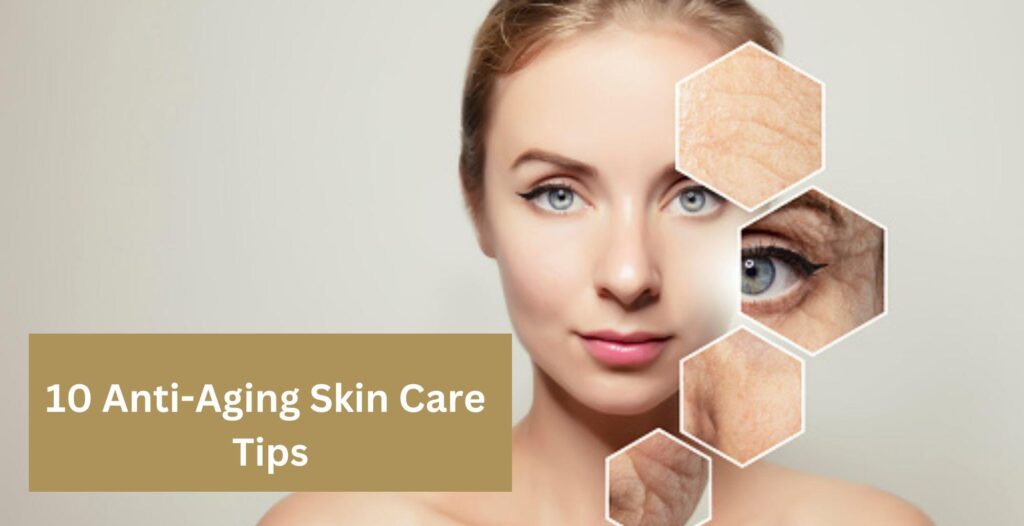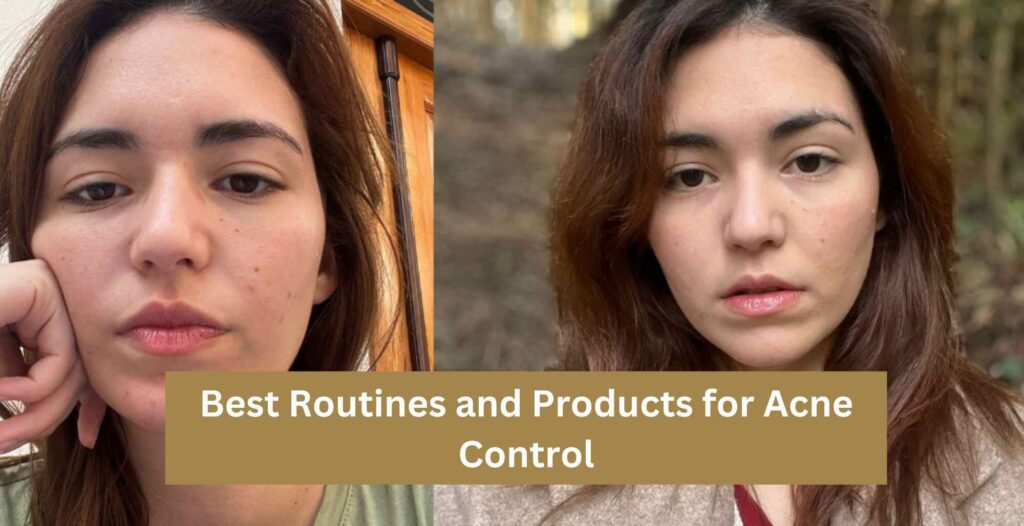To achieve a healthy, balanced complexion, knowing your skin type is essential when it comes to skincare. It may seem paradoxical to people with oily skin to use oil for cleansing. However, because of its ability to control sebum production, eliminate pollutants, and enhance skin health, oil washing has drawn a lot of attention. With the support of data and professional opinions, this article investigates the benefits of oil washing for oily skin so you may make an informed choice.
Yes, oily skin may benefit from oil washing.
eliminates extra oil:
The purpose of oil cleansers is to eliminate makeup and excess oil without drying out the skin or leaving a residue.
minimizes the appearance of pores:
By eliminating dead skin cells, sebum, and debris from your skin, a thorough cleansing can minimize the appearance of pores.
Suitable as a weekly boost:
Oil washing may be used as a special treatment to enhance your skincare regimen once or twice a week.
Table of Contents:
What to About Oil Cleansing
Oil cleansing is a skincare technique that uses oils to cleanse the skin of dirt, makeup, excess sebum, and other impurities. Unlike traditional cleansers that rely on surfactants, oil cleansing leverages the principle of “like dissolves like.” Oils bind to other oils and grime, making it easier to lift impurities from the skin without stripping its natural moisture barrier.
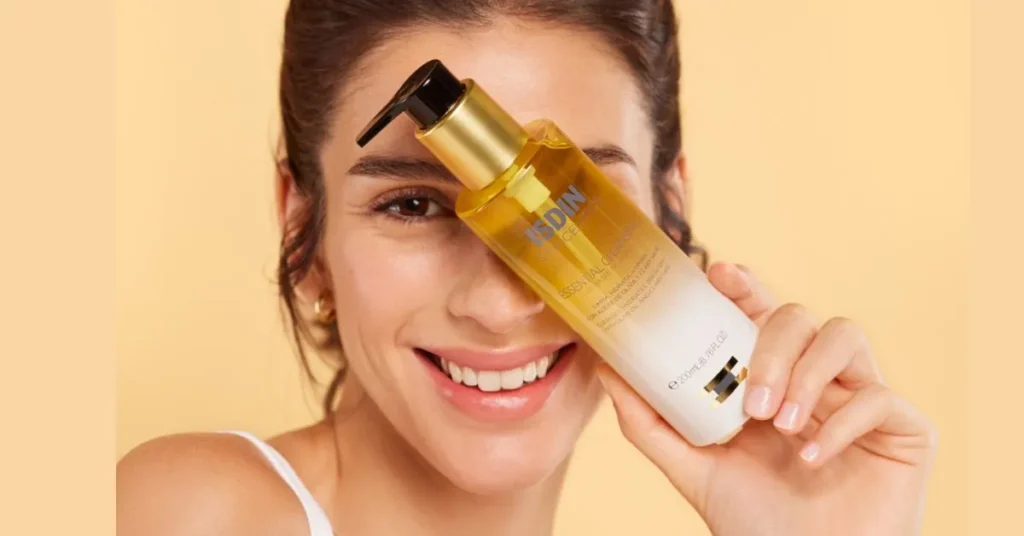
The Oil Cleansing Method
- Warm the Oil: Gently warm a small amount of your chosen oil in your hands.
- Massage: Massage the oil onto your face and neck, paying extra attention to areas with excess oil.
- Remove: Use a warm, damp cloth to wipe away the oil, dirt, and makeup.
- Rinse: Rinse your face with lukewarm water to remove any residue.
- Tone and Moisturize: Follow up with an alcohol-free toner and a lightweight, oil-free moisturizer.
How Oil Cleansing Works
Oil cleansing is based on a simple yet effective principle: like dissolves like. This means that oils can dissolve excess sebum, makeup, and impurities on your skin without disrupting its natural moisture barrier.
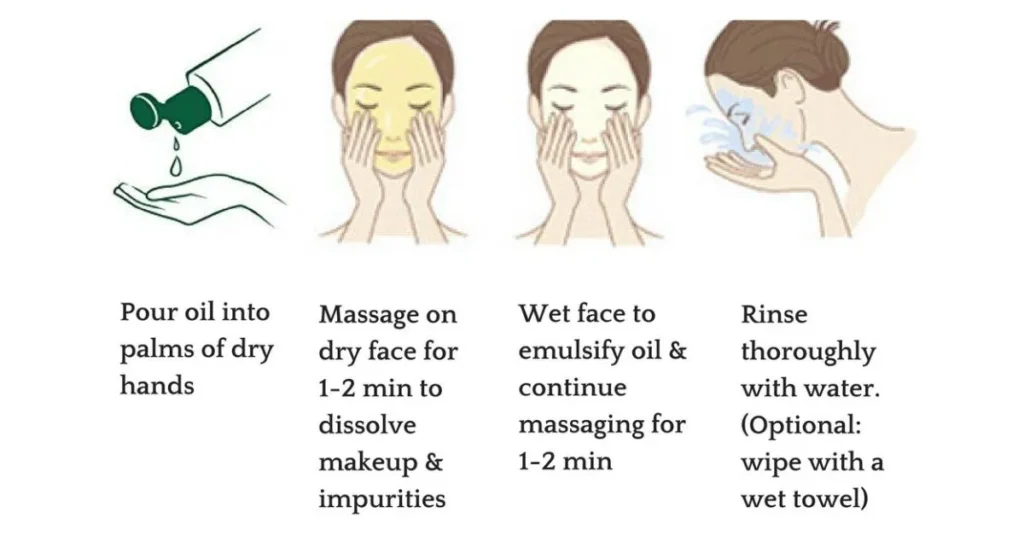
Steps Involved in Oil Cleansing
- Application: A chosen oil or blend is massaged onto dry skin to dissolve impurities.
- Emulsification: Water is added to create an emulsion, allowing the oil and dirt to lift off.
- Rinse Off: A warm, damp cloth or water is used to remove the oil completely.
By gently cleaning the skin, this method avoids the over-drying effects of conventional cleansers.
Is Oil Cleansing Suitable for Oily Skin?
Contrary to popular belief, oil cleansing is highly beneficial for oily skin when done correctly. Many people mistakenly think adding oil to oily skin will make it greasier. However, the right oils can regulate sebum production and balance the skin’s natural oils.
Benefits of Oil Cleansing for Oily Skin
- Deep Cleansing: Oil cleansing effectively removes impurities from your pores, leading to a deeper clean.
- Balancing Oil Production: Regular oil cleansing can help regulate your skin’s natural oil production, preventing excessive oiliness.
- Hydration: Contrary to popular belief, oil cleansing can actually hydrate your skin. It helps maintain the skin’s natural moisture barrier, preventing dryness and irritation.
- Reduced Acne: By removing excess oil and impurities, oil cleansing can help reduce the frequency and severity of acne breakouts.
Potential Downsides of Oil Cleansing
Despite its benefits, there are some potential downsides to consider:
- Skin Purging: This temporary reaction occurs as the skin adjusts to a new routine.
- Improper Oil Use: Using oils with a high comedogenic rating can clog pores.
- Overuse: Cleansing too often or too aggressively may disrupt your skin’s natural balance.
Best Oils for Oily Skin
Choosing the right oil is key to making oil cleansing effective for oily skin. Opt for non-comedogenic oils that do not clog pores.
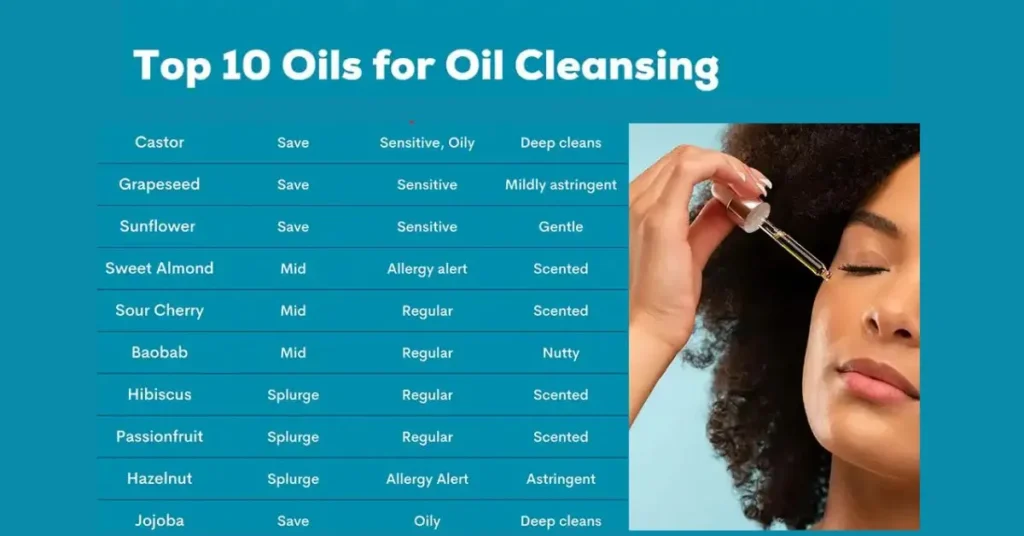
| Oil Type | Key Benefits | Comedogenic Rating |
| Jojoba Oil | Mimics natural sebum; regulates oil | 2 |
| Grapeseed Oil | Lightweight; high in antioxidants | 1 |
| Hemp Seed Oil | Anti-inflammatory; soothes acne | 0 |
| Sunflower Oil | High in linoleic acid; hydrates skin | 0 |
What to Avoid
- Coconut Oil: Though moisturizing, it is comedogenic and can clog pores.
- Olive Oil: May be too heavy for oily skin.
Here are some tips for using oil cleansing for oily skin
- Oil cleanse at night: Oil cleansing can help clean and hydrate your skin before bed.
- Follow up with a rinse-off face wash: After oil cleansing, you can use a rinse-off face wash to deep clean your pores.
- Double cleanse: People with oilier skin may prefer to double cleanse.
- Use a gentle cleanser: People with very oily skin may need to use a gentle cleanser after oil cleansing to remove any residucleansing oil every day?
FAQs:
1. Can I use oil cleansing every day?
While daily oil cleansing is possible, it’s generally recommended to do it 2-3 times a week, especially for those with very oily skin. Over-cleansing can strip your skin of its natural oils.
2. Can oil cleansing worsen acne?
No, if done correctly with non-comedogenic oils, oil cleansing can help reduce acne by clearing clogged pores.
3. Can I skip moisturizer after oil cleansing?
Your skin may feel nourished without the need for a moisturizer. A lightweight, non-comedogenic moisturizer, on the other hand, can improve moisture.
4. How often should you Oil Cleanse?
Oil cleansing should only be done once a day rather than each time you wash your face. As a particular therapy, you may also perform it less regularly. Are you unsure of when this skincare step is most effective? To assist cleanse and moisturize your skin before bed, try to do an oil cleanse at night.
Conclusion:
In conclusion, oil cleansing is a beneficial technique for oily skin, contrary to popular belief. By choosing the right oils and following the proper method, you can effectively remove dirt, oil, and makeup without stripping your skin’s natural moisture barrier. This can lead to a healthier, clearer complexion and reduced acne breakouts. So, don’t be afraid to give oil cleansing a try and experience the transformative effects it can have on your skin.

